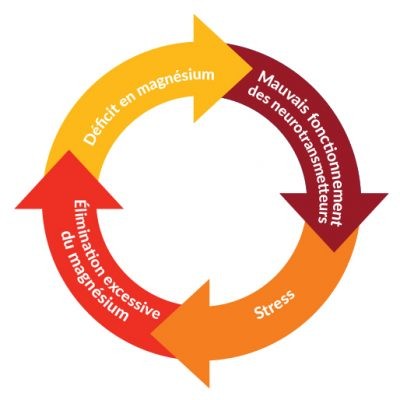In France, more than 70% of the population lacks magnesium. A deficit which is not without consequences on health since this mineral intervenes in many functions of the organism. Several factors can explain insufficient magnesium intake.
According to the European Food Safety Agency (EFSA) 1 , a satisfactory intake (AI) of magnesium amounts to 420 mg per day for a man and 360 mg per day for a woman. But a study 2 conducted in the French population (more than 5000 participants) showed that 77% of women and 72% of men had a magnesium intake lower than these recommendations. This deficiency can be explained by environmental but also physiological factors.
Environmental factors favoring the lack of magnesium
Insufficient food intake
The fact that a large part of the population has a magnesium deficiency is linked to an insufficient dietary intake. Not eating a balanced diet, consuming industrial foods and repeatedly dieting are all behaviors that increase the risk of essential micronutrient deficiencies, including magnesium. According to data from the INCA2 study 3 , the main contributors to the magnesium intake of the adult French population are dairy products (25.7%), fish (9.9%), bread and bakery products ( 7%). However, magnesium is found in greater quantities in other foods that are unfortunately less consumed, such as oilseeds, whole grains or even shellfish.
The stress
Stress is a normal reflex of the body when it feels threatened. It triggers a series of physiological reactions that allow us to escape from the stressor. The heart rate increases to supply our muscles with more blood and oxygen, the muscles contract to flee quickly, the state of alertness is at its maximum, etc. These reactions are partly triggered by a sudden release of adrenaline, a hormone known to remove magnesium from cells. This is then found in the blood and is eliminated by the kidneys. The more stressed you are, the more likely you are to lose magnesium. This magnesium deficiency in turn promotes stress. It’s a vicious circle.

The sport
Intense physical activity increases magnesium losses, especially through sweat. You should know that we eliminate 30 to 40 mg of magnesium per liter of sweat per hour 4 . This loss is all the greater if it is hot. Sports practice also requires energy. However, magnesium is involved in the production of energy by the body. The more energy your body needs, the more magnesium it needs. It is therefore important for athletes to take care of their diet by favoring foods rich in magnesium. Sometimes the diet is not enough to meet magnesium requirements. This is why athletes can consider supplementation during periods of intense effort and thus avoid cramps and fatigue.
Alcohol abuse
Excessive and chronic alcohol consumption causes a loss of vitamins and minerals including magnesium 5 . Magnesium loss is mainly urinary. Excess alcohol also leads to a poorer intestinal absorption of magnesium in the long term.
Certain medications
Regular intake of certain medications can lead to a drop in magnesium reserves in the body. This is the case of the contraceptive pill because the increase in estrogen levels in the body induces a drop in magnesium levels. Certain antibiotics, diuretics, immunosuppressive treatments or even proton pump inhibitors also promote the renal elimination of magnesium.
Physiological factors favoring the lack of magnesium
Some diseases
Before entering the blood, magnesium is absorbed in the intestines. But certain intestinal diseases disrupt this mechanism because they cause chronic or acute diarrhea which promotes magnesium losses 6 . These are Crohn’s disease, celiac disease or ulcerative colitis. Certain renal diseases (acute renal insufficiency) and endocrine can be at the origin of a deficit in magnesium because of a significant elimination in the urines.
age
As we age, our magnesium reserves become depleted. This decrease occurs most often in people over the age of 60. It is explained by :
- a decrease in bone density (more than half of the magnesium is found in the bones).
- poorer intestinal absorption of magnesium.
- impaired kidney function resulting in increased elimination of magnesium in the urine.
- a lower dietary magnesium intake than in younger subjects.
- the presence of diseases that increase the risk of magnesium deficiency (intestinal diseases, type 2 diabetes).
- taking medications that can induce a loss of magnesium.
Also, certain periods of life such as growth, pregnancy and breastfeeding require a higher magnesium intake and can therefore expose you to a risk of deficiency.
The genes
Some people absorb magnesium less well and/or eliminate it in excess. This problem is thought to be due to a genetic alteration that prevents magnesium transport proteins, called TRPM6, from working properly 7 . Consequently, the absorption of magnesium in the intestine is not optimal while its elimination by the kidneys is too high.
What are the symptoms of a lack of magnesium?
Magnesium is involved in over 300 enzymatic reactions in the body. If it is lacking, it can disrupt many important physiological functions and trigger fatigue, stress and muscle disorders.
One of the main symptoms of lack of magnesium is fatigue . This is explained by the important role of magnesium in the production of the energy necessary for the proper functioning of our body. Magnesium allows glucose (our main fuel) present in the blood to migrate inside the muscle cells. And to be transformed into energy, this glucose once again needs magnesium.
Stress can also be a sign of a lack of magnesium . Magnesium contributes to the proper functioning of the nervous system by promoting nerve transmission and regulating the hormones released in stressful situations. A sufficient intake of magnesium therefore limits the negative effects of stress on the body.
The occurrence of cramps and muscle contractures can be linked to a magnesium deficiency. This mineral is involved in the release of energy in the muscles, the neuromuscular transmission but also in the relaxation of the muscles after a physical effort. You should know that about 25% of the total magnesium intake is used by the muscles.
Finally, one of the frequent symptoms of a lack of magnesium is the eyelid that “jumps” or “trembles”. This is what scientists call eyelid fasciculation. These slight tremors generally last a few seconds to a few minutes and are not serious. If they are frequent, magnesium supplementation can help you get rid of them.

Annabelle IglesiasHealth JournalistA graduate of ESJ Pro, Annabelle Iglesias is a freelance journalist specializing in health and wellness. She writes mainly on health and nutrition topics.
Sources
- Update of the PNNS benchmarks: development of nutritional references , ANSES opinion. Collective expert reports. December 2016.
- Dietary magnesium intake in a French adult population , P. Galan and al, SU.VI.MAX study. December 1997.
- National Individual Study of Food Consumption 2 (INCA2), French Food Safety Agency (Afssa), 2006-2007.
- Magnesium and sport , Nicolas Aubineau, sports dietitian nutritionist.
- Alcohol and nutrition , F. Maillot and al, Pathologie Biologie , 2001.
- Digestive tract and magnesium , Med. Int. -Gastroenterology (14), No. 3, March 2000.
- Essential role for TRPM6 in epithelial magnesium transport and body magnesium homeostasis , V. Chubanov and al, European Journal of Physiology , 2005.
- Treat yourself with magnesium , Dr Anne-Laure Denans, Thierry Souccar editions, 2018.



